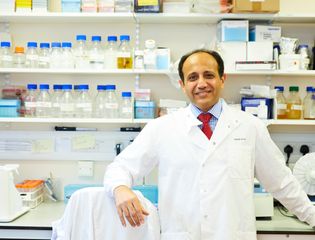OvarianVax - What we know and what happens next
What is OvarianVax?
OvarianVax is a world-first research project aiming to create a preventative vaccine for ovarian cancer. The vaccine is being developed by Professor Ahmed and his team at the University of Oxford, with funding and support from Ovarian Cancer Action and Cancer Research UK.
Rather than treating ovarian cancer after it develops, OvarianVax is designed to train the immune system to stop cancer before it ever starts.
Why is a preventative vaccine for ovarian cancer so important?
Each year, over 6,000 women in the UK and 250,000 globally are diagnosed with high-grade serous ovarian cancer, the most aggressive form of the disease.
Right now, there is no reliable screening method, and symptoms often go unrecognised until the disease is at an advanced stage. Thousands of women, particularly those with a BRCA gene mutation, have a significantly increased risk of developing the disease. But the only way to reduce this risk is through major surgery that impacts fertility and triggers surgical menopause.
A vaccine would offer a life-changing alternative, protecting high-risk women without the need for invasive procedures.
Long-term, we’ve seen what the HPV vaccine has achieved in cervical cancer, moving the world towards eradicating the disease. If successful, OvarianVax has the potential to do the same for a disease that kills 200,000 women worldwide every year.
How does the vaccine work?
The vaccine utilises mRNA technology, a similar approach to that used in COVID-19 vaccines. What is mRNA? mRNA, or messenger RNA, is a molecule that contains the instructions or recipe that directs the cells to make a protein using its natural machinery.
An mRNA vaccine has two key components:
- An instruction manual (mRNA code) – This teaches the immune system to recognise and destroy ovarian cancer cells by targeting specific markers called epitopes.
- A delivery system – This ensures the mRNA is safely and effectively transported into immune cells, triggering a protective response.
The goal is for the immune system to develop “immune memory” - the ability to detect and respond to cancer cells before they can form a tumour.
What progress has been made so far?
Over the past decade, Ovarian Cancer Action has funded a broad programme of discovery science led by Professor Ahmed. This research uncovered how ovarian cancer starts in the fallopian tubes and how the immune system may detect these changes early.
In 2024, this foundational work led to the launch of the OvarianVax programme. Cancer Research UK funded Phase 1 is now underway, focused on testing the most promising epitopes to build the vaccine’s mRNA “instruction manual”. Early lab results are highly promising.
What is Ovarian Cancer Action funding?
Ovarian Cancer Action is funding the next phase of vaccine development. This funding will:
- Optimise the vaccine code: finalise the sequence of epitopes to trigger the strongest immune response.
- Develop the delivery system: ensure the vaccine is safely and effectively delivered to immune cells.
- Test the safety and effectiveness of the vaccine in the lab.
Funding these areas will help prepare the vaccine for clinical-grade production, the last step before human trials can begin
This work is designed to run in parallel with the CRUK-funded project to avoid delays in moving to trials.
Who will be involved in the early trials?
The first clinical trials will prioritise women at high genetic risk, including those with the BRCA gene mutation. Around 150,000 women in the UK, and 10 million globally, carry this mutation, putting them at increased risk of developing ovarian cancer.
Because they have a higher likelihood of developing the disease, starting the trials with these women will allow us to get an answer about whether the vaccine works through clinical trials quicker than testing it in the general public.
How is the patient voice being included?
Ovarian Cancer Action is establishing a patient advisory group made up of women with a BRCA mutation, current ovarian cancer patients, and women in the general public not affected by the disease.
This group is:
- Contributing to the design and communication of the vaccine project
- Helping to build a database of potential trial participants
- Ensuring the project remains patient-focused, ethical, and inclusive
When could OvarianVax be available?
If development continues on schedule, OvarianVax could be ready for clinical trials within five years. These early-stage human trials are a critical step in proving the vaccine’s safety and effectiveness.
With success, the vaccine could eventually become widely available, offering a future where fewer women face the fear and impact of ovarian cancer.
How can I support OvarianVax?
This is a bold and ambitious project and it needs your support.
You can:
- Donate to help fund the next phase of this life-saving research
- Register your interest in clinical trials if you carry a BRCA mutation
- Spread the word to raise awareness about the need for preventative solutions
Still have questions?
Contact our research team or sign up to receive updates about OvarianVax and our wider research programmes.

